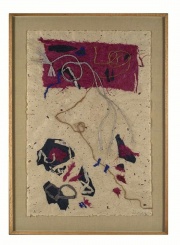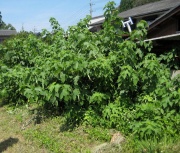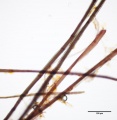Kozo
Description
A Bast fiber from the inner bark of mulberry trees, such as the Paper mulberry Broussonetia papyrifera. Kozo is an important paper fiber in traditional Japanese, Korean, and Chinese hand-papermaking. The plant requires little chemical intervention to create high quality fibers. Kozo is used as a general term for Japanese lining papers. Kozo papers are often used for backing when Asian scrolls are relined.
Synonyms and Related Terms
kozo paper; paper mulberry; torinoko (at least 20% kozo); hosho (thick); moriki (delicate)
Other Properties
Paper fiber type: non-woody/bast. Using transmitted light microscopy, fibers appear thick walled with varying width. A distinct cuticle layer is present on the outside of fibers. Dislocations and cross-markings are present, but faint. Appearance with Graff "C" stain: purple-red, ranging from light to dark. Average dimensions of fibers: length 10mm, width 30 μm. Common pulping method: prepared by retting and mechanical separation.
Additional Images
Authority
- Matt Roberts, Don Etherington, Bookbinding and the Conservation of Books: a Dictionary of Descriptive Terminology, U.S. Government Printing Office, Washington DC, 1982
- Book and Paper Group, Paper Conservation Catalog, AIC, 1984, 1989
- The Dictionary of Paper, American Paper Institute, New York, Fourth Edition, 1980
- Marja-Sisko Ilvessalo-Pfäffli. Fiber Atlas: Identification of Papermaking Fibers (Springer Series in Wood Science). Springer, 1995.
- Walter Rantanen. "Fiber ID Course." Integrated Paper Services. June 2013. Lecture.
- Bernard Toale, The Art of Papermaking, Davis Publications, Portland OR, 1983
- Art and Architecture Thesaurus Online, http://www.getty.edu/research/tools/vocabulary/aat/, J. Paul Getty Trust, Los Angeles, 2000





